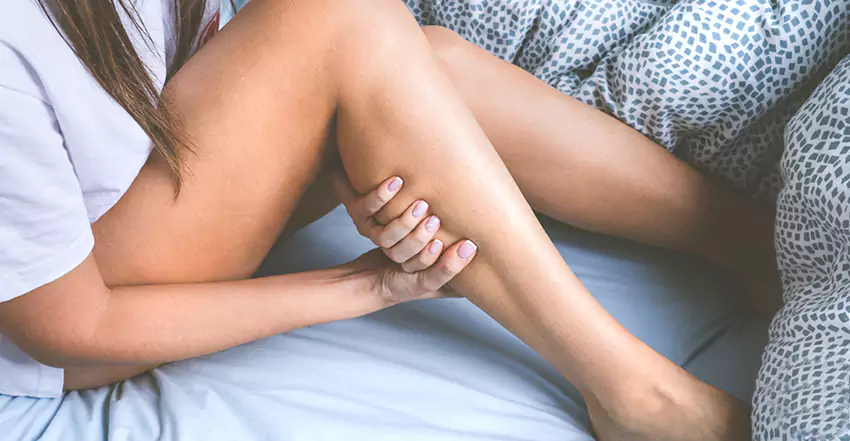Cramps & Muscle Cramps
Shibumi2023-05-25T21:10:23+00:00Cramps & Muscle Cramps
Relieving Cramps and Muscle Cramps Naturally: Holistic Remedies and Prevention

Cramps and muscle cramps can be both uncomfortable and disruptive to daily life. Whether you experience leg cramps, foot cramps, or cramps in other parts of the body, understanding their causes and finding effective natural remedies is essential for relief. In this article, we will explore the causes of cramps, how to stop muscle cramps, the potential deficiencies associated with leg cramps, and highlight foods that can help prevent muscle cramps.
Understanding the Causes of Cramps:
Cramps can occur due to various factors, including muscle overuse, dehydration, electrolyte imbalances, nutrient deficiencies, poor blood circulation, and nerve compression. Identifying the underlying cause is crucial in finding the most suitable remedies. However, it’s important to note that cramps can vary from person to person, so it may require some experimentation to determine the specific triggers.
How to Stop Muscle Cramps Naturally:
Hydration: Dehydration is a common cause of muscle cramps, so staying properly hydrated throughout the day is essential. Ensure you drink an adequate amount of water and consider incorporating hydrating foods such as watermelon, cucumber, and coconut water into your diet.
Electrolyte Balance: Electrolytes, such as potassium, magnesium, and calcium, play a vital role in muscle function. Consuming foods rich in these electrolytes can help prevent muscle cramps. Consider including bananas, leafy greens, avocados, almonds, and yogurt in your diet.
Stretching and Massage: Stretching the affected muscles gently and massaging the area can provide immediate relief during a cramp. Regular stretching exercises can also help prevent cramps from occurring.
Heat and Cold Therapy: Applying a warm compress or taking a warm bath can help relax the muscles and alleviate cramps. In some cases, using a cold compress or ice pack can also be effective, especially if there is inflammation or swelling accompanying the cramp.
Natural Muscle Relaxants: Certain herbs and supplements possess muscle relaxant properties and can aid in relieving cramps. Examples include chamomile, valerian root, magnesium supplements, and arnica gel. Consult with a healthcare professional or herbalist to determine the appropriate options for you.
Nutrient Deficiencies Associated with Leg Cramps:
Leg cramps can sometimes indicate deficiencies in certain nutrients. Common deficiencies linked to muscle cramps include magnesium, potassium, calcium, and vitamin D. Incorporating foods rich in these nutrients into your diet can help address these deficiencies and potentially reduce leg cramps. Examples include dark leafy greens, nuts and seeds, dairy products (if tolerated), fatty fish, and fortified foods.
Causes of Leg Cramping at Night:
Leg cramps (includes constipation), muscle cramps and restless legs that occur at night, often referred to as nocturnal leg cramps, can be particularly bothersome. They can be caused by factors such as muscle fatigue, dehydration, nutrient deficiencies, and poor blood circulation. Implementing the natural remedies mentioned earlier, including proper hydration, stretching before bed, and ensuring adequate intake of electrolytes and essential nutrients, may help alleviate nocturnal leg cramps.
What Our Expert Says
According to Allan Wohrnitz, our Nutrition expert, Potassium, CalMag and Vitamin B1 can help address cramps and muscle cramps. Vitamin B1 & Potassium are both essential to burn glucose to convert to energy. If lacking, muscles cramp due to no energy available to contract or relax muscles. Vitamin B2 to carry oxygen to the mitochondria, the energy factory where B1 and Potassium are present to convert glucose to energy, and Vitamin B5 also for energy production.
Lack of B1, Lactic Acid is formed. During the breakdown of glucose to produce energy, Pyruvic and Lactic Acid are formed after athletic performance. (Pyruvic acid – a liquid formed to help release energy to the body).
B1 breaks down the Pyruvic Acid to Carbon Dioxide (exhaled air) and water.
Vitamin B1 is needed to convert Lactic Acid into glycogen (storage sugar).
If an under-supply of B1 occurs, those changes cannot occur and the acids remain in the tissues which irritates them.
The accumulation of Pyruvic and Lactic Acid are toxic to the brain cells, causes muscle stiffness and sore joints.
Lack of B1 can cause muscles to stop functioning causing intestinal cramps and constipation or IBS (Irritable Bowel Syndrome) as well as heart attacks.
These supplements provide essential nutrients that support muscle function and help prevent cramping.
Foods That Prevent Muscle Cramps:
Incorporating certain foods into your diet can help prevent muscle cramps by providing essential nutrients and electrolytes. Consider adding the following to your meals:
Bananas: Rich in potassium, bananas help maintain proper muscle function and prevent cramps.
Leafy Greens: Spinach, kale, and other greens are excellent sources of magnesium, which supports muscle relaxation and prevents cramps.
Oranges: These citrus fruits are not only hydrating but also provide vitamin C and electrolytes that can help reduce muscle cramps.
Yogurt: A good source of calcium, yogurt can help prevent muscle cramps by supporting muscle contraction and relaxation.
Sweet Potatoes: Packed with potassium and magnesium, sweet potatoes can help maintain electrolyte balance and reduce the risk of muscle cramps.
Almonds: Rich in magnesium, almonds can contribute to muscle relaxation and reduce the likelihood of cramps.
Salmon: A great source of omega-3 fatty acids and vitamin D, salmon supports overall muscle health and may help prevent cramps.
Muscle Cramp Facts
- A muscle cramp is an involuntarily and forcibly contracted muscle that does not relax
- Muscle cramps can occur in any muscle; cramps of the leg muscles and feet are particularly common
- Almost everyone experiences a muscle cramp at some time in their life
- There are a variety of types and causes of muscle cramps
- Muscle cramps may occur during exercise, at rest, or at night, depending upon the exact cause
- Dehydration is a common cause of muscle cramps
- Numerous medicines can cause muscle cramps
- Most muscle cramps can be stopped if the muscle can be stretched
- Muscle cramps can often be prevented by measures such as adequate nutrition and hydration, attention to safety when exercising, and attention to ergonomic factors
Conclusion:
Cramps and muscle cramps can be debilitating, but natural, organic, and holistic remedies can provide relief and prevent their occurrence. By addressing potential nutrient deficiencies, maintaining proper hydration, incorporating stretching exercises, and consuming foods rich in essential electrolytes and nutrients, you can support your muscles and minimize the risk of cramps. However, if cramps persist or become severe, it is advisable to consult a healthcare professional to rule out any underlying medical conditions. Embracing a holistic approach to muscle health can contribute to overall well-being and help you lead a more active and comfortable life.

